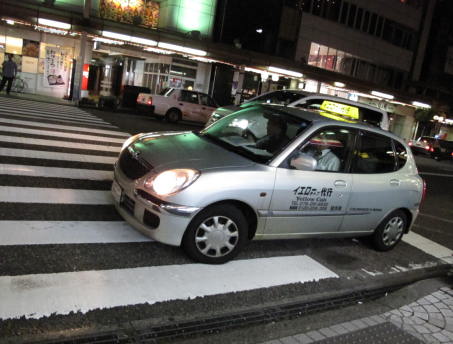Drinking parties are the preferred way to bond with coworkers after leaving the office, as a way to celebrate big events like school graduations and weddings, or as just a way to get together with friends, but Japan has a zero-tolerance policy when it comes to drinking and driving. The moment alcohol touches your lips, you are considered unfit to operate a vehicle for at least 8 hours, even if you feel perfectly sober and capable–so what does that mean for people who drive to drinking parties? Do they leave their car and get it in the morning? Maybe. Abstain from drinking? Some do. But there’s a better way, so you can have your beer and drink it too: daikou.
Things I’ll Miss #2: Daikou
For about the same price as a taxi–and oftentimes actually less–you can call a daikou service to come pick you and your car up from the pub and take you home. Daikou (代行) basically means “acting as agent” if you translate the meaning of the kanji directly, and here is a nifty diagram from the Kanagawa Prefectural Police’s website to explain how the service works.
Partiers call up a daikou company of their choice (there are normally several different options, even in small towns like ours), and the company sends two drivers out together in a company car to pick said partiers up from their watering hole. Like a taxi, you give them the address of where you’re going (be that home or to an after party), but unlike a taxi, you then you get into your own car and one of the drivers will drive it for you, while the other driver follows behind in the company car.
The only drawback of daikou is that wait times can approach up to two hours depending on how late into the night you call for one. Even then, though, if you call for a daikou when your party is wrapping up, the wait goes by quickly since chances are people will linger to chat.
This is a great service that eliminates the need for designated drivers, but more importantly, in conjunction with tough laws and severe penalties, helps cut down on the rates of drunk driving in Japan. Jeff and I have used daikou services several times in the past as a safe way home from a party, and it’s definitely a service we would like to see imported into the States.
How do you get home safely after a party?



While I love the concept of daikou, I remember only using it once in Japan. Usually, I would cycle home after a drinking party in Japan. Although I was told countless times that it was illegal to cycle home while intoxicated, I usually cycled home after beers. I do remember once cycling home while uncomforably drunk – but it was roughly two minutes to my house.
There are plenty of people who cycle home after a drinking party regardless of the legality, haha. In small towns I don’t think it’s much of a problem unless you’re doing something to catch the police’s attention 🙂 We only used daikou when it was too far to walk home–too far being more than a half hour walk. -Kristin
Pingback: The 10 Things I’ll Miss About Japan–No.01: Karaoke | Slomads